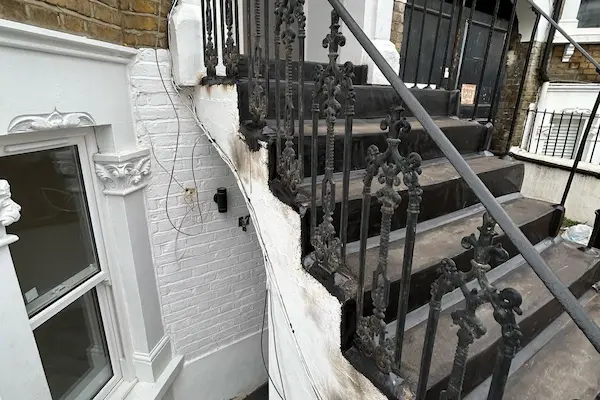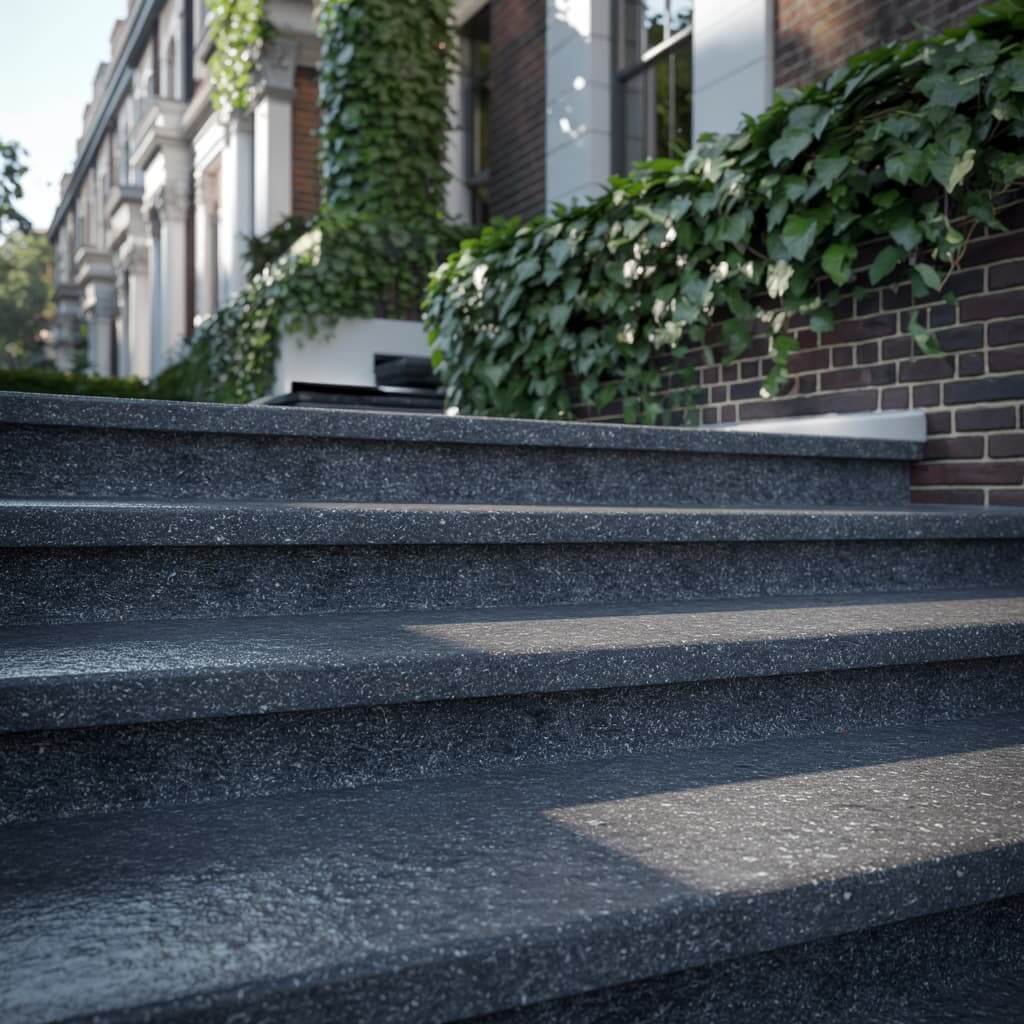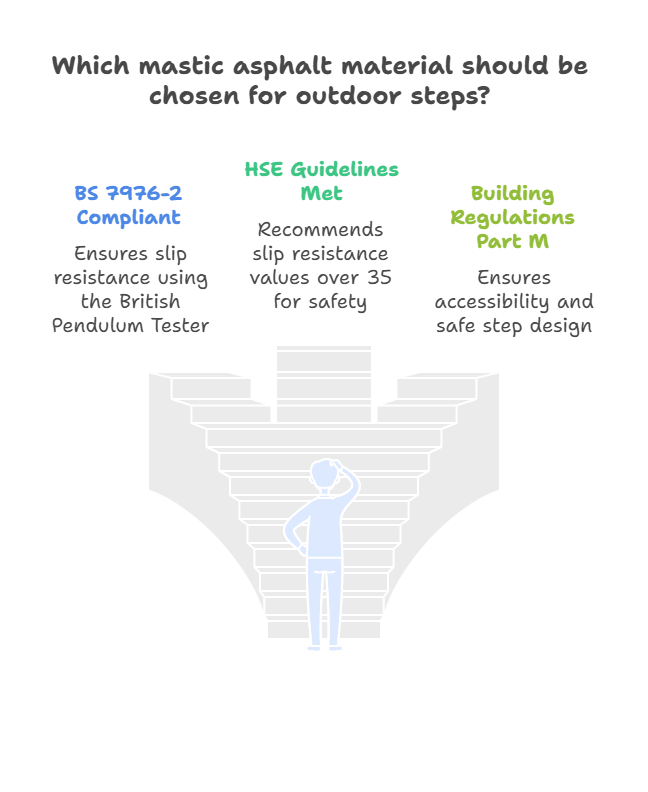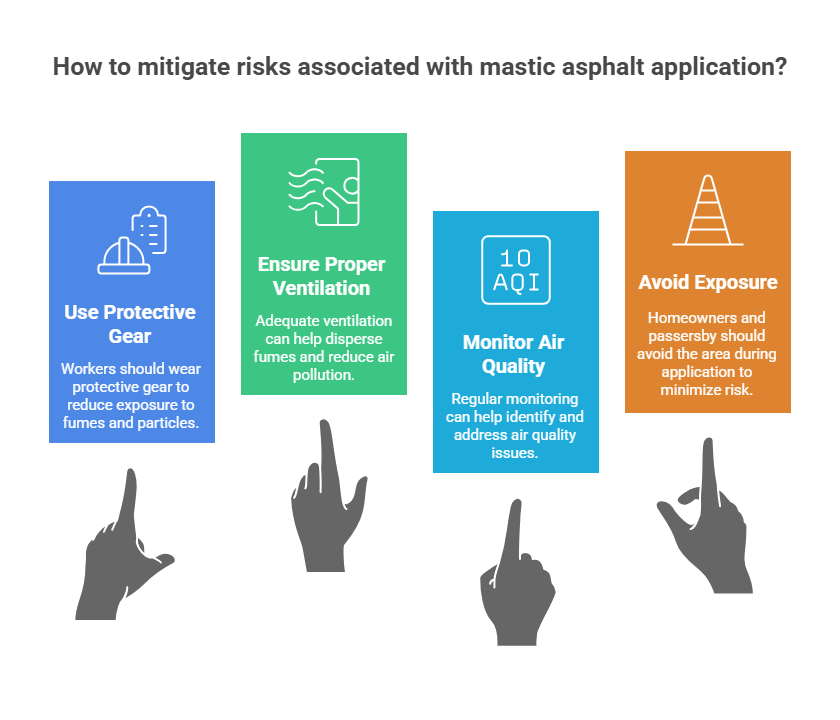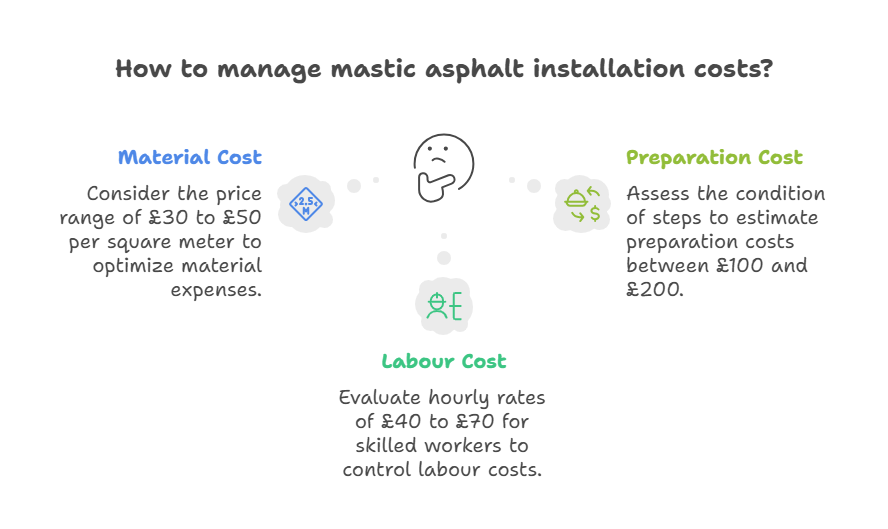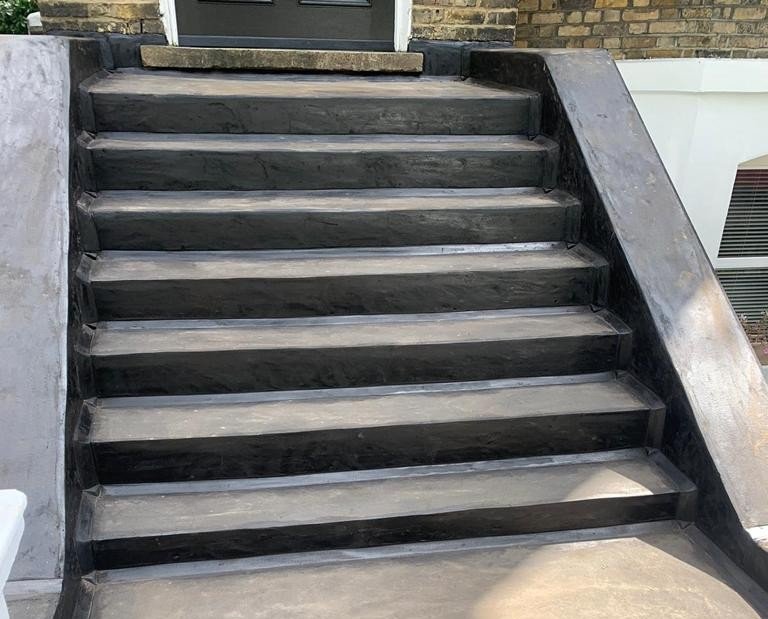
Contents
Our Services
Liquid waterproofing
What Client Say
I would just like to say a big thank you to the Denco team for the work they recently did on our roof, such a great finish. They repaired the old asphalt and covered it with a lovely new grey liquid coating. Leaving the premises very clean and tidy, we are so pleased with the end result. Thank you again guys.
Thank you to Lee and his colleagues from Denco Waterproofing for the outstanding job that they have completed on our balcony. Very impressed with there standard of workmanship and will definitely be having them back to replace the flat roof on our extension soon.
Great work by the Denco Waterproofing lads, very hard working, extremely tidy and the attention to detail was top class. Well done job all round. Many thanks.
Need help?
Don't hesitate to contact us
Send a message
Are you thinking about using mastic asphalt for your outdoor steps in the UK? You might wonder if it’s safe, durable, and the right choice for your home.
Outdoor steps take a beating from weather and foot traffic. So, choosing the right material is key. Find out what you need to know about mastic asphalt—its safety, benefits, and important tips. By the end, you’ll feel confident making the best decision for your outdoor space.
Keep reading to find out if mastic asphalt is the smart, safe option for your steps.
Mastic Asphalt Basics
Mastic asphalt is a popular material in the UK for outdoor steps and other surfaces. Its durability and water resistance make it a strong choice for many projects. Knowing the basics of mastic asphalt shows why it’s seen as safe and effective for outdoor steps. This section explains the composition and properties of mastic asphalt and its common uses in construction.
Composition And Properties
Mastic asphalt is a mixture of natural bitumen, sand, and limestone. It is heated to a high temperature to create a thick, workable material. Once cooled, it hardens into a solid, waterproof layer.
- Natural bitumen: Acts as a binder, giving waterproofing and flexibility.
- Sand and limestone: Provide strength and bulk to the mix.
- Heat application: Ensures a smooth, seamless finish.
The key properties of mastic asphalt include:
| Property | Benefit |
| Waterproof | Prevents water damage and reduces slipping risks |
| Durable | Resists wear and tear from foot traffic and weather |
| Flexible | Handles slight movements without cracking |
| Heat resistant | Maintains performance even in hot weather |
These features make mastic asphalt a reliable choice for outdoor environments. It can handle rain, frost, and temperature changes well. The material has a smooth surface. You can add anti-slip coatings for safety.
Common Uses In Construction
Mastic asphalt is widely used in the UK for various construction tasks. Its waterproof and durable nature suits many areas exposed to weather and foot traffic.
- Outdoor steps: Provides a solid, slip-resistant surface.
- Roofing: Creates a waterproof barrier on flat and pitched roofs.
- Flooring: Used in industrial and commercial floors for durability.
- Balconies and terraces: Protects against water ingress and wear.
- Road and pavement repairs: Offers a lasting, weatherproof fix.
Construction workers prefer mastic asphalt because it forms a seamless layer. This reduces weak points where water can enter. The material can be shaped on-site, fitting uneven surfaces easily.
In outdoor steps, mastic asphalt improves safety by reducing slips and trip hazards. It also lasts longer than many other materials. Maintenance is simple since the surface is easy to clean and repair.
Durability In Uk Climate
Mastic asphalt is a popular choice for outdoor steps across the UK. Its durability plays a key role in its safety and long-term performance. The UK climate is wet and cold, which can be tough on many building materials. Understanding how mastic asphalt works helps homeowners and builders make smart choices. This section looks at how mastic asphalt steps hold up in typical UK weather.
Weather Resistance
Mastic asphalt is very tough against the UK’s weather. It forms a smooth, waterproof layer. This layer prevents water from entering the structure underneath. This resistance protects the steps from damage due to moisture and temperature changes.
The material is flexible, so it can expand and contract with temperature changes. This flexibility helps it avoid cracking. This is essential in the UK, where temperatures can vary significantly between seasons.
- Waterproof surface: Blocks water infiltration
- UV resistant: Prevents surface degradation from sun exposure
- Flexible texture: Adapts to temperature changes
- Low maintenance: Requires minimal upkeep
Below is a table summarising how mastic asphalt compares to other common materials for outdoor steps:
| Material | Water Resistance | Flexibility | UV Resistance | Maintenance |
| Mastic Asphalt | Excellent | High | Good | Low |
| Concrete | Moderate | Low | Moderate | Moderate |
| Natural Stone | Good | Low | High | Moderate |
Impact Of Rain And Frost
The UK experiences frequent rain and frost, which can harm outdoor steps. Mastic asphalt offers strong protection against these issues. Its waterproof nature stops rainwater from penetrating the surface. This reduces the risk of water pooling and causing slips.
Frost causes freeze-thaw cycles. Water gets trapped, freezes, and expands, which creates cracks. Mastic asphalt’s flexibility and dense composition help it resist this damage. The material absorbs the pressure without breaking.
- Rainwater: Drains off easily without soaking into the material
- Frost resistance: Prevents cracks and surface damage
- Slip resistance: Textured surface reduces accidents in wet conditions
Slip Resistance On Steps
Slip resistance is a key concern for outdoor steps, especially in the UK’s wet climate. Mastic asphalt is popular for outdoor steps because it is durable and weather-resistant. But the safety of mastic asphalt depends largely on its slip resistance. Steps must provide a secure grip to prevent falls. This matters for everyone, including kids, seniors, and people with mobility challenges. Knowing how mastic asphalt resists slipping helps homeowners and builders choose safely.
Surface Texture Options
Mastic asphalt can be finished with different surface textures to improve slip resistance. The texture affects how much grip the surface provides, especially when wet. Here are common texture options:
- Smooth Finish: A clean look, but can be slippery when wet.
- Aggregate Finish: Small stones or grit mixed into the surface for roughness.
- Textured Patterns: Grooves or ridges pressed into the asphalt for extra grip.
- Anti-slip Coatings: Special coatings applied on top to enhance friction.
Each texture has pros and cons. Smooth finishes are easy to clean but less safe on wet steps. Aggregate finishes offer better grip but may collect dirt. Textured patterns provide a balance of safety and aesthetics. Anti-slip coatings add safety but need periodic reapplication.
Here is a comparison table of slip resistance values (measured by the British Pendulum Test) for typical mastic asphalt textures:
| Surface Texture | Slip Resistance Value (BS 7976-2) | Wet Grip Rating |
| Smooth Finish | 25-30 | Low |
| Aggregate Finish | 35-45 | Medium |
| Textured Patterns | 40-50 | High |
| Anti-slip Coatings | 45-55 | Very High |
Safety Standards And Testing
The UK has strict safety rules for outdoor steps to reduce slip risks. Mastic asphalt surfaces must meet certain standards before installation. These standards focus on slip resistance, durability, and weather safety.
Key safety standards include:
- BS 7976-2:Measures slip resistance using the British Pendulum Tester.
- HSE Guidelines: Health and Safety Executive recommends slip resistance values over 35 for outdoor steps.
- Building Regulations Part M: Accessibility rules for safe step design.
Testing methods for mastic asphalt slip resistance include:
- British Pendulum Test: Simulates foot slipping and provides a slip resistance value.
- Surface Roughness Measurement: Measures texture depth and profile.
- Wet Pendulum Testing: Assesses grip under wet conditions typical in the UK.
Products that pass these tests offer better protection against slips. Builders often ask for test certificates before choosing mastic asphalt materials. Regular maintenance also keeps the slip resistance effective over time.
Installation Considerations
Installing mastic asphalt on outdoor steps in the UK requires careful planning. The installation process affects the durability and safety of the steps. Proper installation ensures the surface stays waterproof, slip-resistant, and long-lasting. Understanding key installation considerations helps achieve the best results for outdoor steps.
Preparation Requirements
Good preparation is the first step to a successful mastic asphalt installation. The surface must be clean, dry, and stable before laying the material. Any dirt, loose particles, or moisture can cause poor adhesion and early failure.
Steps to prepare the surface:
- Clean thoroughly: Remove dust, grease, moss, and old paint.
- Dry the area: Ensure the steps are dry for at least 24 hours before starting.
- Check for cracks: Repair any damage with suitable filler or concrete.
- Level the surface: Smooth uneven areas to avoid pooling water.
- Install edging: Use metal or timber edges to contain the asphalt.
Use a primer to enhance bonding between the substrate and the asphalt. Primers must be compatible with mastic asphalt and applied evenly.
Professional Vs Diy
Mastic asphalt installation demands skill and experience. Professionals understand how to heat and apply the material correctly. They use special tools to achieve a smooth, even finish that lasts.
Consider the following points:
- Safety: Professionals handle hot materials safely to avoid burns or damage.
- Equipment: Experts have access to industrial heaters and rollers.
- Quality: Skilled installers ensure proper thickness and surface texture.
- Time: Professionals complete the job faster and clean up thoroughly.
DIY installation is possible but risky without proper knowledge. Mistakes like uneven layers or poor adhesion can lead to cracks and water ingress.
Hiring a professional is best for lasting, safe outdoor steps. DIY might suit small or simple repairs only. Always consider your experience and available tools before deciding.
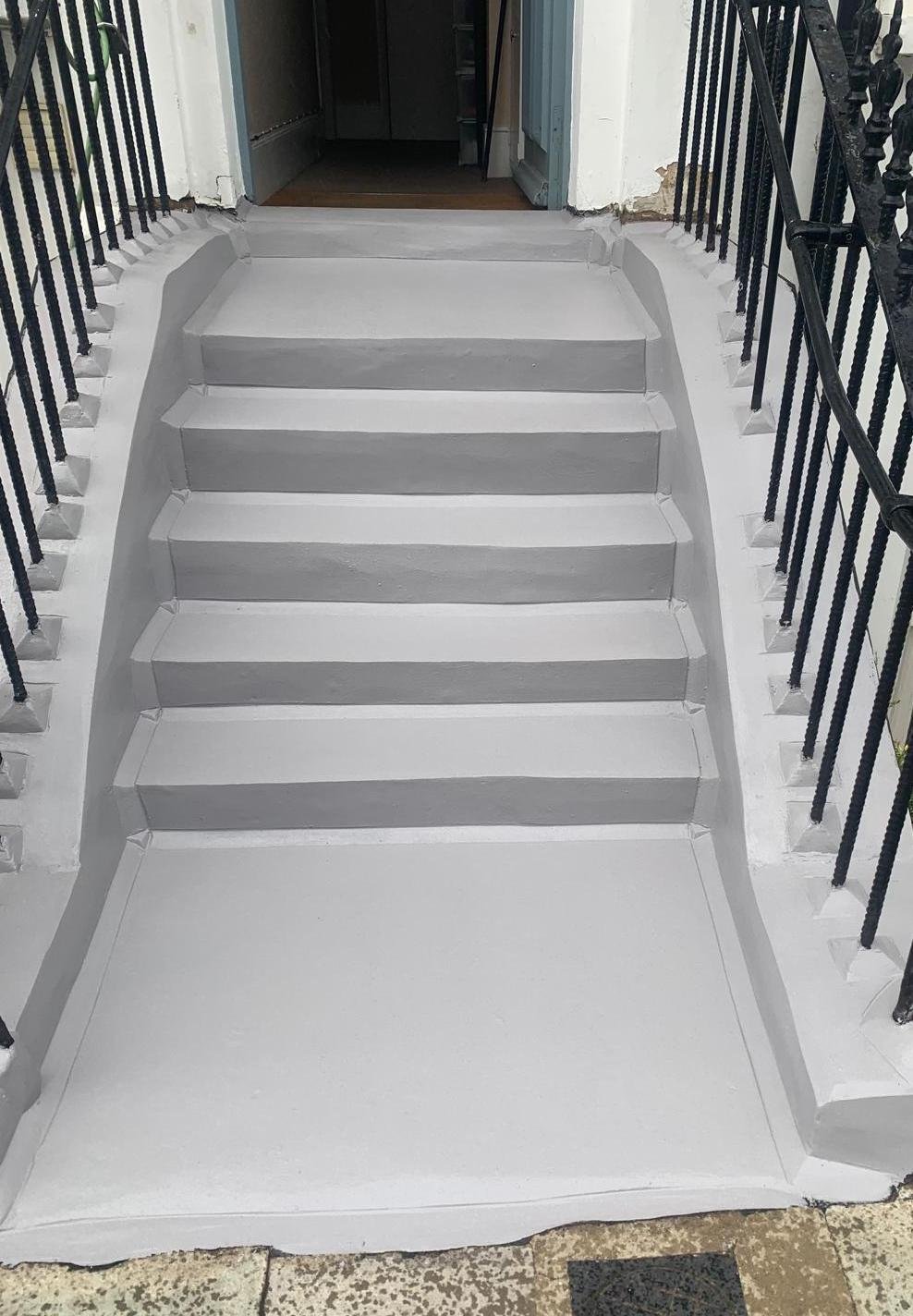
Maintenance And Longevity
Mastic asphalt installation demands skill and experience. Professionals understand how to heat and apply the material correctly. They use special tools to achieve a smooth, even finish that lasts.
Cleaning Techniques
Keeping mastic asphalt steps clean is essential for safety and longevity. Dirt, moss, and debris can build up, making steps slippery and causing damage over time. Use gentle cleaning methods to avoid harming the surface.
- Clear loose debris with a soft broom or brush regularly.
- Wash the surface with warm water and mild detergent.
- Avoid harsh chemicals or high-pressure washers; they can erode the asphalt.
- Remove moss and algae with a diluted vinegar solution or a specialist moss killer safe for asphalt.
Here is a simple cleaning routine:
- Sweep the steps to remove leaves and dirt.
- Mix a bucket of warm water with mild soap.
- Use a soft brush to scrub the steps gently.
- Rinse with clean water to remove soap residue.
- Allow the steps to dry completely before use.
Regular cleaning preserves the texture and slip resistance of the mastic asphalt. It also helps spot early signs of damage.
Repair And Recoating
Maintaining the surface integrity of mastic asphalt steps requires timely repairs and occasional recoating. Small cracks or worn areas can worsen without attention.
Follow these steps for effective repair and recoating:
- Inspect steps regularly for cracks, holes, or loose areas.
- Clean the damaged area thoroughly before repair.
- Apply mastic asphalt patch to cracks or holes using a trowel.
- Allow proper curing time before foot traffic.
- Recoating the entire step surface every 5-7 years extends protection.
Recoating helps restore waterproofing and slip resistance. Use a professional-grade mastic asphalt coating product designed for outdoor use in the UK climate.
| Maintenance Task | Frequency | Purpose |
| Inspection | Every 3-6 months | Identify damage early |
| Minor repairs | As needed | Prevent further cracking |
| Recoating | Every 5-7 years | Maintain durability & waterproofing |
Proper repair and recoating keep mastic asphalt steps strong and safe. Timely action avoids costly full replacements and maintains a neat appearance.
Environmental And Health Factors
Picking the right material for outdoor steps in the UK is about more than just looks and strength. Environmental and health factors are key in deciding if mastic asphalt is suitable. This section looks at how mastic asphalt impacts the environment and human health. It can help you choose safer options for your outdoor space.
Toxicity And Emissions
Mastic asphalt is made from bitumen, sand, and fillers, heated to high temperatures during application. This process can release fumes that may affect air quality. The main concerns include:
- Bitumen fumes: These contain chemicals that may irritate the eyes, skin, and lungs.
- Volatile Organic Compounds (VOCs): Small amounts can be emitted during heating, contributing to air pollution.
- Dust particles: Fine particles can be harmful if inhaled during mixing or cutting.
Workers applying mastic asphalt should use protective gear to reduce exposure. For homeowners or passersby, the risk is much lower once the material cools and hardens.
Once set, mastic asphalt is stable and does not release harmful substances. It also resists water and weather, reducing chemical runoff into soil or water.
Eco-friendly Alternatives
For those concerned about environmental impact, several alternatives to mastic asphalt exist for outdoor steps. These options offer lower toxicity and better sustainability:
- Recycled Rubber Paving: Made from used tires, it reduces landfill waste and offers good slip resistance.
- Permeable Concrete: Allows water to pass through, reducing runoff and improving drainage.
- Natural Stone: Durable and natural, with minimal processing required.
- Composite Decking: Made from recycled wood and plastic, it is long-lasting and low-maintenance.
Comparing these alternatives with mastic asphalt:
| Material | Environmental Impact | Health Safety | Durability |
| Mastic Asphalt | Moderate (emissions during installation) | Low risk after curing | High |
| Recycled Rubber | Low (reuses waste) | Safe | Medium |
| Permeable Concrete | Low (improves water drainage) | Safe | High |
| Natural Stone | Very Low (natural material) | Safe | Very High |
| Composite Decking | Low (recycled materials) | Safe | High |
Choosing eco-friendly materials supports UK environmental goals and ensures safer outdoor spaces. Consider the local climate, step usage, and maintenance needs when selecting an alternative.
Cost Analysis
When selecting mastic asphalt for outdoor steps in the UK, it’s important to think about the cost. Cost analysis helps you understand if this material fits your budget and needs. It covers how much you pay at the start and what value you get over time. This guide breaks down the expenses and benefits to help you decide.
Initial Investment
The initial investment for mastic asphalt on outdoor steps includes materials, labour, and preparation. This cost can be higher than other options like concrete or wood. But it offers strong protection against the weather and wear.
- Material cost: Mastic asphalt prices vary but usually range from £30 to £50 per square meter.
- Labour cost: Skilled workers charge between £40 and £70 per hour due to the specialised application process.
- Preparation: Steps must be clean and smooth, which can add £100 to £200 depending on condition.
Here’s a simple table to compare initial costs for common step materials:
| Material | Approximate Cost per m² | Labour Cost | Preparation Cost |
| Mastic Asphalt | £30 – £50 | £40 – £70/hr | £100 – £200 |
| Concrete | £20 – £40 | £30 – £50/hr | £50 – £150 |
| Wood | £25 – £45 | £25 – £45/hr | £50 – £100 |
Choosing mastic asphalt means paying more up front. The price reflects its durability and weather resistance. This material is less likely to crack or fade under UK weather conditions.
Long-term Value
The long-term value of mastic asphalt comes from its durability and low maintenance. It lasts many years without needing repairs or replacement. This can save money over time.
- Durability: Mastic asphalt can last 20+ years on outdoor steps.
- Maintenance: Requires minimal upkeep compared to wood or concrete.
- Weather resistance: Resists rain, frost, and UV damage well.
Consider the cost of maintenance and repairs for other materials over 10 years:
| Material | Estimated 10-Year Maintenance Cost | Repair Frequency |
| Mastic Asphalt | £100 – £200 | Rare |
| Concrete | £300 – £600 | Occasional cracks and resurfacing |
| Wood | £500 – £900 | Frequent sealing and replacement |
Investing in mastic asphalt reduces future costs. Its weatherproof nature keeps steps safe and looking good. This lowers the risk of slips or damage, which can add extra expenses.
Reach out to our team for support or inquiries about Is Mastic Asphalt Safe for Outdoor Steps in the UK?
If you want outdoor steps that stay safe and strong in the UK weather, mastic asphalt is a great choice. It keeps out water, stands up to rain and frost, and won’t wear down easily. Even during wet winters, it stays solid and slip-resistant, so everyone can walk with confidence. With the right care, your steps will last for years without trouble.
At Denco Liquid Waterproofing, we take pride in making steps that are both safe and long-lasting. If you’d like strong, reliable outdoor steps that give you peace of mind, we’re here to help.
Get in touch with us today — let’s make your steps safe and built to last.
All You Need to Know
Is Mastic Asphalt Slip-resistant For Outdoor Steps?
Yes, mastic asphalt offers good slip resistance when textured properly. This makes it safe for outdoor steps, especially in wet UK conditions. It reduces the risk of slips and falls, enhancing safety for pedestrians in all weather.
How Durable Is Mastic Asphalt On Outdoor Steps?
Mastic asphalt is highly durable and weather-resistant. It withstands heavy foot traffic and harsh UK weather without cracking. Proper installation and maintenance ensure it lasts for decades, making it a cost-effective choice for outdoor steps.
Does Mastic Asphalt Require Regular Maintenance Outdoors?
Mastic asphalt requires minimal maintenance. Regular cleaning and occasional inspections prevent dirt buildup and damage. Small repairs can extend its lifespan. This low-maintenance feature suits outdoor steps exposed to UK weather.
Can Mastic Asphalt Handle UK Winter Weather?
Yes, mastic asphalt performs well in UK winters. It resists frost damage and remains stable under freeze-thaw cycles. This durability ensures outdoor steps stay safe and intact through cold, wet conditions.

